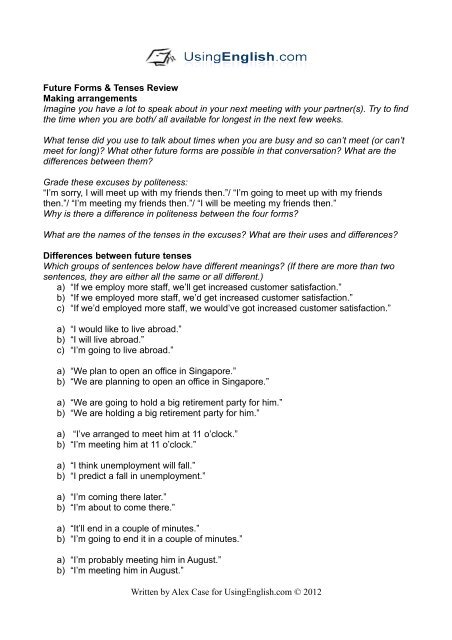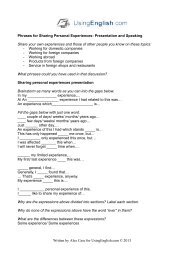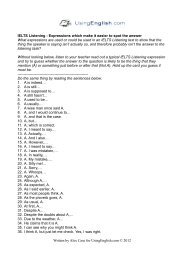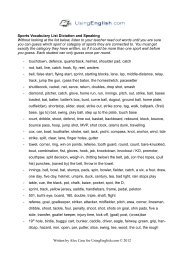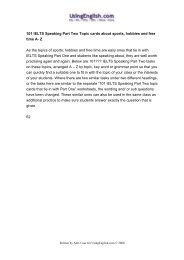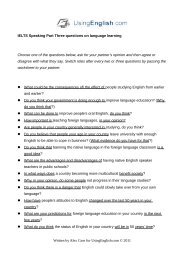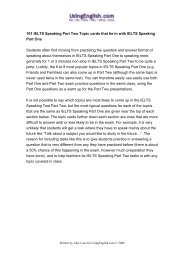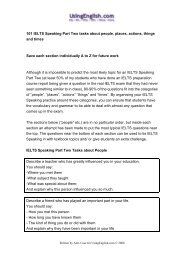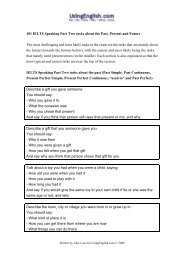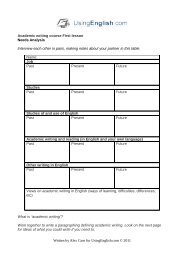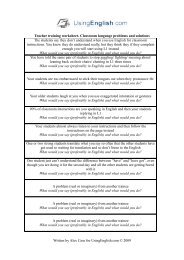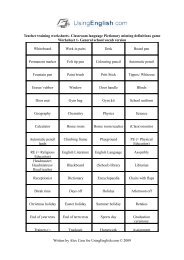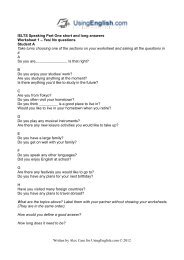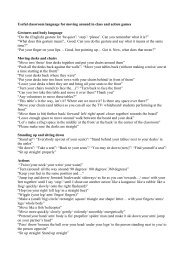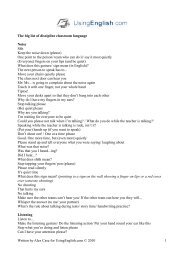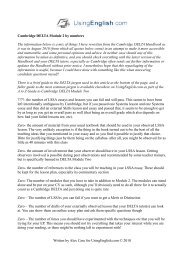Future Forms & Tenses Review
Future Forms & Tenses Review
Future Forms & Tenses Review
You also want an ePaper? Increase the reach of your titles
YUMPU automatically turns print PDFs into web optimized ePapers that Google loves.
<strong>Future</strong> <strong>Forms</strong> & <strong>Tenses</strong> <strong>Review</strong><br />
Making arrangements<br />
Imagine you have a lot to speak about in your next meeting with your partner(s). Try to find<br />
the time when you are both/ all available for longest in the next few weeks.<br />
What tense did you use to talk about times when you are busy and so can’t meet (or can’t<br />
meet for long)? What other future forms are possible in that conversation? What are the<br />
differences between them?<br />
Grade these excuses by politeness:<br />
“I’m sorry, I will meet up with my friends then.”/ “I’m going to meet up with my friends<br />
then.”/ “I’m meeting my friends then.”/ “I will be meeting my friends then.”<br />
Why is there a difference in politeness between the four forms?<br />
What are the names of the tenses in the excuses? What are their uses and differences?<br />
Differences between future tenses<br />
Which groups of sentences below have different meanings? (If there are more than two<br />
sentences, they are either all the same or all different.)<br />
a) “If we employ more staff, we’ll get increased customer satisfaction.”<br />
b) “If we employed more staff, we’d get increased customer satisfaction.”<br />
c) “If we’d employed more staff, we would’ve got increased customer satisfaction.”<br />
a) “I would like to live abroad.”<br />
b) “I will live abroad.”<br />
c) “I’m going to live abroad.”<br />
a) “We plan to open an office in Singapore.”<br />
b) “We are planning to open an office in Singapore.”<br />
a) “We are going to hold a big retirement party for him.”<br />
b) “We are holding a big retirement party for him.”<br />
a) “I’ve arranged to meet him at 11 o’clock.”<br />
b) “I’m meeting him at 11 o’clock.”<br />
a) “I think unemployment will fall.”<br />
b) “I predict a fall in unemployment.”<br />
a) “I’m coming there later.”<br />
b) “I’m about to come there.”<br />
a) “It’ll end in a couple of minutes.”<br />
b) “I’m going to end it in a couple of minutes.”<br />
a) “I’m probably meeting him in August.”<br />
b) “I’m meeting him in August.”<br />
Written by Alex Case for UsingEnglish.com © 2012
What are the differences in meaning between the groups of sentences that are different?<br />
How can you summarise the future uses of will, going to and Present Continuous above<br />
and the differences between them?<br />
What is the most general explanation of the differences between those three future<br />
tenses?<br />
Which sentences above disprove these common but wrong explanations of future tenses?<br />
- Will is used for the distant future, going to for the mid term and Present Continuous<br />
for the near future<br />
- Use Present Continuous for things that are more certain, going to for things which<br />
are possible and will for things which are less probable<br />
Which sentences below have different meanings?<br />
a) “I need some more lever arch files.” “I’ll go to the shops and get you some.”<br />
b) “I need some more lever arch files.” “I’m going to the shops so I’ll get you some.”<br />
a) “The ink is going to run out soon.”<br />
b) “The ink will run out soon.”<br />
a) “May I offer to do it for you?”<br />
b) “Shall I do it for you?”<br />
c) “I’ll do it for you.”<br />
Which uses of going and will above were not covered in the first part of this lesson?<br />
Do the same with these other future tenses and future forms<br />
a) “I’ll be writing my second novel by then.”<br />
b) “I’ll have written my second novel by then.”<br />
a) “I look forward to hearing from you.”<br />
b) “I’m looking forward to hearing from you.”<br />
c) “Looking forward to hearing from you.”<br />
a) “I look forward to your call.”<br />
b) “I expect you to call.”<br />
c) “I’m waiting for your call.”<br />
a) “Could you do this by Friday?”<br />
b) “Could you do this until Friday?”<br />
c) “Could you do this before Friday?<br />
d) “Could you do this on Friday?”<br />
a) “We’ll meet again ten days later.”<br />
b) “We’ll meet again in ten days.”<br />
Written by Alex Case for UsingEnglish.com © 2012
Suggested answers<br />
The four excuses are already in order of politeness, with the <strong>Future</strong> Continuous (“I will be<br />
+ ing”) the most polite because it sounds the most fixed and unavoidable and <strong>Future</strong> with<br />
Will (also called <strong>Future</strong> Simple, “I will”) the most impolite because it just means there is a<br />
strong possibility but nothing is arranged. Present Continuous (“I’m meeting”) is standard<br />
in this situation because it means I have an arrangement, but Going to (“I’m going to<br />
meet”) wouldn’t usually be polite because it would just mean I have a plan to meet them.<br />
a) “If we employ more staff, we’ll get increased customer satisfaction.”<br />
b) “If we employed more staff, we’d get increased customer satisfaction.”<br />
c) “If we’d employed more staff, we would’ve got increased customer satisfaction.”<br />
All different. (c) is talking about the past. (b) is much more unlikely than (a).<br />
a) “I would like to live abroad.”<br />
b) “I will live abroad.”<br />
c) “I’m going to live abroad.”<br />
All different. (c) is a plan, (a) is a desire, and (b) is a prediction that it will happen.<br />
a) “We plan to open an office in Singapore.”<br />
b) “We are planning to open an office in Singapore.”<br />
The same.<br />
a) “We are going to hold a big retirement party for him.”<br />
b) “We are holding a big retirement party for him.”<br />
Different. (a) means we are planning to, whereas (b) means at least some arrangements<br />
(e.g. booking the space or asking people to come) have already been done.<br />
a) “I’ve arranged to meet him at 11 o’clock.”<br />
b) “I’m meeting him at 11 o’clock.”<br />
The same<br />
a) “I think unemployment will fall.”<br />
b) “I predict a fall in unemployment.”<br />
The same.<br />
a) “I’m coming there later.”<br />
b) “I’m about to come there.”<br />
Different. (b) means very soon.<br />
a) “It’ll end in a couple of minutes.”<br />
b) “I’m going to end it in a couple of minutes.”<br />
Different. (b) is my decision, whereas (a) is my prediction about something I can’t control.<br />
a) “I’m probably meeting him in August.”<br />
b) “I’m meeting him in August.”<br />
Slightly different. My arrangement is more likely to change in (a).<br />
Written by Alex Case for UsingEnglish.com © 2012
Present Continuous is used for arrangements (= it has already involved another person in<br />
setting it up), Going to is used for plans (=my decision), and Will is used for predictions (=<br />
my imagination about something I can’t control) above.<br />
“Will is used for the distant future” etc is disproved by “It’ll end in a couple of minutes”.<br />
“Use Present Continuous for things that are more certain” etc is disproved by “I’m probably<br />
meeting him in August”.<br />
a) “I need some more lever arch files.” “I’ll go to the shops and get you some.”<br />
b) “I need some more lever arch files.” “I’m going to the shops so I’ll get you some.”<br />
Different. In (b) it was already planned, but in (a) the person is speaking while deciding.<br />
a) “The ink is going to run out soon.”<br />
b) “The ink will run out soon.”<br />
Different. (a) is based on present evidence, e.g. seeing how much ink is left. (b) is just<br />
based on ideas, e.g. experience that it always runs out two weeks after being refilled.<br />
a) “May I offer to do it for you?”<br />
b) “Shall I do it for you?”<br />
c) “I’ll do it for you.”<br />
The same.<br />
a) “I’ll be writing my second novel by then.”<br />
b) “I’ll have written my second novel by then.”<br />
Different. In (a) writing will be in progress at that time, but in (b) writing will be finished.<br />
a) “I look forward to hearing from you.”<br />
b) “I’m looking forward to hearing from you.”<br />
c) “Looking forward to hearing from you.”<br />
The same meaning (although formality is different).<br />
a) “I look forward to your call.”<br />
b) “I expect you to call.”<br />
c) “I’m waiting for your call.”<br />
Different. (b) and (c) are basically nagging.<br />
a) “Could you do this by Friday?”<br />
b) “Could you do this until Friday?”<br />
c) “Could you do this before Friday?<br />
d) “Could you do this on Friday?”<br />
All different. (a) and (c) are the most common, with (c) meaning “by Thursday”. (d) would<br />
mean just on that day, while (b) would have the unusual meaning of from now and<br />
stopping on Friday.<br />
a) “We’ll meet again ten days later.”<br />
b) “We’ll meet again in ten days.”<br />
Different. (b) means from now, but (a) means from another time (not the present).<br />
Written by Alex Case for UsingEnglish.com © 2012


